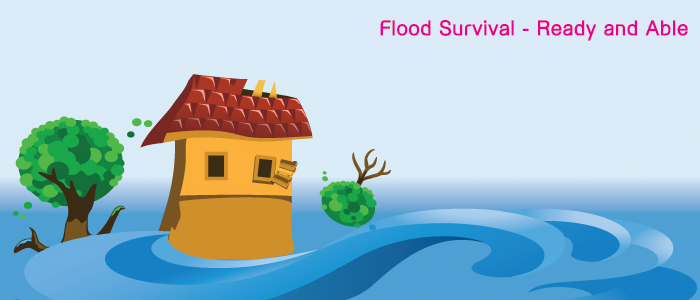
If your house is near a watercourse or is in a low-lying area it could be flooded, even if you have never seen flood waters there before. This guide lists simple things you and your family can do to stay safe and protect your property.
Be prepared
Know your local flood history.
Ask your local administrators about the following :
• What the terms major, moderate and minor flooding mean for your area.
• What is the official river height that your home becomes isolated or inundated?
• Know your local flood plans and understand when you may need to evacuate and how to find the nearest safe location.
When you hear a flood warning or if flooding appears to be likely
• Tune in to your local radio station and listen for warnings and advice.
• Check that your neighbours also know of the flood warning.
• Prepare to move vehicles, outdoor equipment, garbage, chemicals and poisons to higher locations.
• Plan which indoor items you will raise or empty out if water threatens to enter your home.
• Check your Emergency Survival Kit and remember your pets.
Act on flood warnings
When you hear a flood warning, you should :
• Stack your furniture and possessions above the likely flood-level. Make sure you have your electrical equipment on top.
• Secure objects that could float in the flood water and cause damage.
• Move garbage, chemicals (like poisons or fuel) to a high and secure place.
• If you have a shop or commercial property, relocate stock and equipment to a higher position away from the water.
• If you live on a farm, move livestock to high ground.
• Check your car and fill it with fuel.
• Check your Emergency Survival Kit and Emergency Pantry List
• Make sure you have fresh water supplies.
During a flood
If you need to evacuate
You may be asked to evacuate, but if you plan to leave before that - tell the police or State and Territory Emergency Service and your neighbours. In either case, you should take these actions:
• Firstly, pack warm clothing, essential medication, valuables, personal papers, photos and mementos in waterproof bags, to be taken with your Emergency Survival Kit.
• Raise furniture, clothing and valuables onto beds, tables and into roof space (electrical items highest).
• Empty freezers and refrigerators, leaving doors open (to avoid damage or loss if they float about).
• Turn off electricity, water and gas and take your mobile phone.
• Put sandbags in the toilet bowl and over all laundry/bathroom drain-holes to prevent sewage back-flow.
• Don’t forget your pets.
• Lock your home and take the recommended evacuation routes for your area.
• Don't drive into water of unknown depth and current.
If you stay
If you remain in your home or when you return take these precautions:
• Keep your Emergency Survival Kit safe and dry.
• Do not eat food which has been in contact with floodwater and boil all water until supplies have been declared safe.
• Don't use gas or electrical appliances which have been flood-affected, until safety-checked.
• Beware of snakes and spiders which may move to drier areas in your house.
• Avoid wading, even in shallow water as it may be contaminated.
• If you must entershallow floodwater, wear solid shoes.
• Check with police for safe routes before driving anywhere and don't enter water without checking depth and current.
• Keep listening to your local radio or TV station and follow all warnings and advice.
After a flood
Flood water can be extremely polluted. Follow these tips to reduce risk of injury, sickness or infection:
• Do not eat food which has been in contact with flood water.
• Boil all water until supplies have been declared safe.
• Do not handle wet electrical equipment.
• Avoid wading even in shallow water as it may be contaminated.
• If you must enter shallow flood water, wear solid boots or shoes for protection.
• Beware of snakes and spiders which may move to drier areas in your house.
• Check with police for safe routes before driving anywhere.
More Information
One-Stop Survival Preparedness Guide : Click here
Reference
Emergency Management :
(http://www.ema.gov.au/www/ema/schools.nsf/Page/Learn_AboutFloods_ReadyandAble_ReadyandAble)
One-Stop Survival Preparedness Guide :
(http://www.one-stop-survival-guide.com/floods.html)

